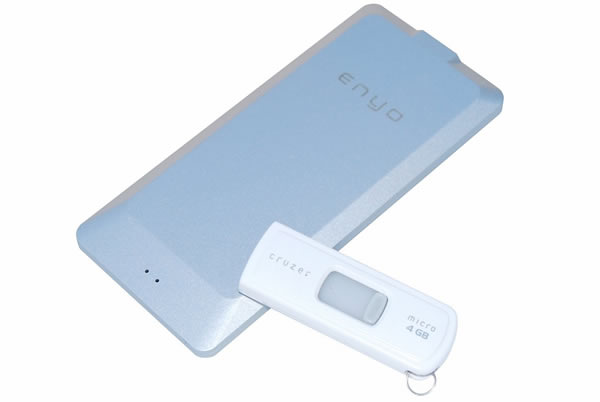Final Thoughts
With a price tag of $410 for the 128GB version it's clear that the Enyo is not a product designed for the masses. For saving, copying or backing up documents and even pictures, OCZ's newest portable drives are probably overkill, as these kinds of tasks can be carried out using a much more affordable USB 2.0 storage device. However, users that regularly move large volumes of data are going to see a real difference with this device.
The OCZ Enyo is a fine example of what can be achieved when combining SSD performance with the new USB 3.0 interface. The fact that we were able to copy a 6GB file in just over a minute blew us away; especially given the Vertex 2 took thirteen more seconds to complete the same task using the SATA 3Gb/s bus.
With such an extravagant price tag the Enyo will remain a luxury item for most, but the same can be said of solid-state drives in general. To put things into perspective, the 100GB OCZ Vertex 2 currently sells for around $350, which actually works out to be a little more expensive per gigabyte than the 128GB Enyo ($3.5 versus $3.2) and in many cases it was slower. Meanwhile, Intel asks around $450 for the 160GB X25-M SSD, which works out to about $2.8 per gigabyte – it's a better deal from the price per gigabyte perspective but you need to spend a little more overall for the extra capacity.
Of course the aforementioned drives will serve different purposes. Whereas the Vertex 2 and X25-M can greatly boost your system's performance when installed as the OS and applications drive, the OCZ Enyo is meant to provide you with similar speeds to make backups or take your data on the road. And while not everyone requires a portable device that can transfer large files at around 7x faster than a typical USB 2.0 drive, frankly, we feel that high speed portable storage is already well overdue.

In terms of performance the OCZ Enyo showed no weaknesses. It's certainly on the pricy side but this is far from surprising given you are virtually buying an OCZ Vertex drive with a USB 3.0 controller attached to it. Perhaps the only complaint we have is that the Enyo feels a bit fragile despite being encased in aluminum. This is a legitimate concern when you are talking about a portable drive you'll be carrying around, and even more so when you consider the price.
It's a good thing that there are no moving parts, but still, when compared to the more bulky durable portable drives, the Enyo fails to give users the peace of mind that they can get away with a little bit of rough play. On the flipside, the advantage of its design is that the drive is sleek, lightweight and most importantly compact.
The other potential issue the Enyo faces that we simply can't ignore is the currently limited adoption of USB 3.0. Sure, the drive will be capable of blazing fast speeds when hooked up to your USB 3.0 equipped computer at home or the office, but once you are out and about there's a big chance you'll find yourself back in the slow lane, transferring files at USB 2.0 speeds with your super expensive solid-state drive. This will happen pretty much on any computer that pre-dates 2010.
Of course being fully backwards compatible is great news, and the limited speed issue should become less of a concern as USB 3.0 adoption ramps up, whether by people buying new computers or upgrading their old ones with a PCI card. But for now it's definitely something you must consider before plunging your hard earned cash on one of these.
Overall the OCZ Enyo is a seriously impressive piece of hardware that offers unparalleled performance, taking portable storage to new heights. It's a must have item for those regularly moving large volumes of data who want to do so with the convenience of a compact and easy to use storage solution. Other than the price, we have no complaints about the Enyo, but unfortunately that is something to be expected of SSD storage at this point.